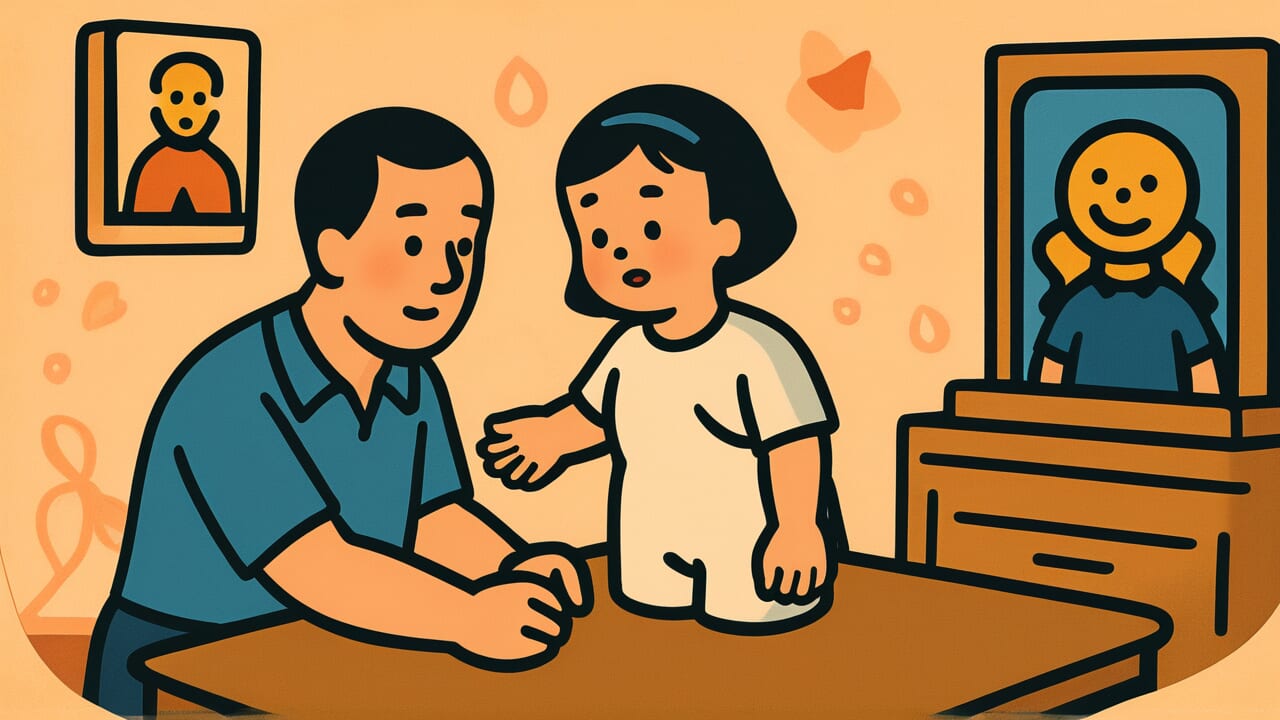How to Read “Even a loving father cannot love a useless child”
ji-aru-chichi-mo-eki-naki-ko-wa-aisezu
Meaning of “Even a loving father cannot love a useless child”
This proverb shows the limits of human affection. Even the most compassionate and loving father cannot continue loving a child who serves no purpose.
The term “useless” here refers to someone who contributes nothing to family or society. It describes a state of simply depending on others without any effort.
We often say parental love is unconditional. Yet watching a child make no effort and refuse to grow becomes unbearable suffering for parents.
This proverb served as a warning to children. It taught them not to take parental love for granted. Children should fulfill their role as family members.
This may sound harsh today. But it conveys a universal truth about parent-child relationships. Both sides need effort and responsibility.
Origin and Etymology
The exact source of this proverb has several theories. Most likely it comes from Chinese classical thought, especially Confucianism.
Confucianism values parent-child affection deeply. But it also emphasizes practical benefits and usefulness.
The phrase “loving father” symbolizes unconditional parental love. Parents naturally love their children simply for existing.
However, “useless child” reflects society’s values about practicality and utility. In pre-Edo period Japan, children had important roles. They inherited the family and cared for aging parents.
This saying emerged from a conflict between ideals and reality. Even the most compassionate father struggles to love a child who cannot help the family or clan.
It reveals how even parental love was measured by social usefulness. This reflects the values of that era.
But this proverb isn’t coldly stating the limits of love. It mainly serves as a warning to children. The message is clear: don’t just depend on parental love. Become a useful person.
Usage Examples
- That gentle father finally lost patience with his son. Even a loving father cannot love a useless child, after all.
- Even the most generous boss gets strict with employees who produce no results. Even a loving father cannot love a useless child.
Universal Wisdom
This proverb reveals a universal truth about human nature. Even love has limits.
We hold up the ideal that parental love is unconditional. But real human relationships are not that simple.
No matter how deep your affection, your heart grows weary. This happens when someone never tries to respond to your love.
This saying has endured because it honestly acknowledges emotional complexity. Love is beautiful, but one-sided love cannot last.
Love is an interaction. The receiving side must respond somehow. This doesn’t mean material rewards. It might be an attitude of growth or a caring heart.
This proverb warns against the dangers of indulgence and dependency. We all live supported by someone’s affection.
But if we take that love for granted and make no effort, eventually that love will wither. Whether parent and child, husband and wife, or friends, relationships need effort from both sides.
Don’t just be loved. Try to remain someone worth loving. This attitude is the secret to keeping relationships rich.
When AI Hears This
Watch parent birds feeding multiple chicks. You’ll notice something interesting. Weak or slow-growing chicks clearly receive less food.
This looks cruel but makes biological sense. Parents have limited energy and time. Concentrating resources on chicks with higher survival rates increases the chance of passing on genes.
Evolutionary biologist Robert Trivers proposed parental investment theory. Parents constantly calculate investment per offspring.
For example, devoting everything to a sickly child might be wasteful. If that child cannot reach breeding age, all invested energy is lost.
Focusing resources on healthy children makes more sense. Those children will likely produce many grandchildren. Parents unconsciously calculate “return on investment.”
Human society shows similar patterns. Research reports that parents show less interest in children with low academic performance or poor social adaptation.
Criticizing this morally is easy. But biologically, it’s just a resource allocation system optimized over hundreds of millions of years.
Even love is a functional tool that evolved to serve gene survival.
Lessons for Today
This proverb teaches modern people about responsibility on the receiving side. This applies to any relationship.
Parental love, friends’ kindness, a boss’s expectations, a partner’s support. Do you take these for granted?
What matters is trying to remain someone worth loving. You don’t need to be perfect.
Just show an attitude of trying to grow. Express gratitude. Act with consideration for others. These small responses keep relationships rich.
Modern society overflows with messages like “love me as I am.” But this shouldn’t become an excuse to abandon effort.
Valuing yourself and fulfilling responsibilities to others can coexist. Becoming someone who can respond to others’ affection leads to true self-esteem.
What are you giving back to people who support you? Perfect results aren’t necessary.
Just don’t completely depend on their love. Keep trying to respond in your own way. That’s the key to protecting precious relationships.



Comments